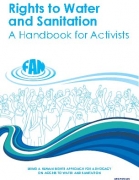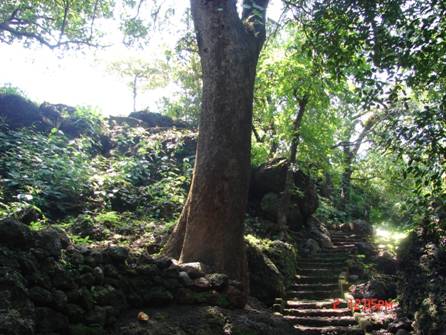/topics/rural-water
Rural Water
Society for Rural, Urban & Tribal Initiative (SRUTI) calls for Advocacy Fellowship - Apply by - 20th February, 2011
Posted on 16 Feb, 2011 04:02 PMSociety for Rural, Urban and Tribal Initiative (SRUTI) is a not-for-profit organisation that facilitates social action across rural and urban India towards a more equitable and democratic society that envisions dignity and justice for all.
This short-term fellowship, awarded to 7 applicants, aims to document key issues and struggles for justice addressed by the SRUTI Fellows through their individual efforts and people’s movements in different parts of the country.
The broad areas of work are:
- Right to Natural Resource Livelihood (Jal, Jangal, Zameen)
- Effective Governance
- Education
- Caste Discrimination
- Rights to the City and Education.
The SRUTI Fellows area of work spreads across 12 states: Uttarakhand, Delhi, Rajasthan, Madhya Pradesh, Maharashtra, Bihar, Jharkhand, Chhattisgarh, Orissa, Andhra Pradhesh, Tamil Nadu and Karnataka.
The Advocacy Fellows and films will be mentored and directed by Rita Banerji who has aligned with the SRUTI team to facilitate and monitor the project.
The Fellowship will begin in the first week of March with an orientation workshop to sensitize the selected Advocacy Fellows to the issues on the ground and introduce them to the SRUTI Fellows. The workshop will also mentor and train them to research, script, document and put together the series of films.
Right to water and sanitation - A handbook for activists by Freshwater Action Network (FAN) Global
Posted on 31 Jan, 2011 10:11 PM With tihs, they can improve water and sanitation service regulation and provision at international, national and local levels. Directed primarily at community groups, human rights NGOs, rights-based development practitioners and aid workers, this handbook aims to strengthen human rights-based advocacy by providing innovative and practical suggestions that activists and organisations can use in their work. It also acts as a resource guide for finding further information.
With tihs, they can improve water and sanitation service regulation and provision at international, national and local levels. Directed primarily at community groups, human rights NGOs, rights-based development practitioners and aid workers, this handbook aims to strengthen human rights-based advocacy by providing innovative and practical suggestions that activists and organisations can use in their work. It also acts as a resource guide for finding further information.
Water and sanitation are essential for living a healthy life with dignity. However, around a billion people across the world lack access to a safe and sufficient water supply to cover their basic needs. Over 2.5 billion people lack access to adequate sanitation and nearly 1.2 billion face the indignity of open defecation every day.
The Millennium Development Goal (MDG) target to halve the proportion of people without sustainable access to safe drinking water and basic sanitation by 2015 is seriously off track, with sanitation severely lagging behind. For example, estimates suggest that at current rates of progress, sub-Saharan Africa will miss the MDG water target by about 25 years, while the sanitation target may not be reached until well into the 22nd century.
Ensuring sustainable drinking water security in rural areas - PIB Release
Posted on 28 Jan, 2011 04:40 PM Hitherto the role of the government was that of a service provider, with minimum involvement of the community in the planning process and the implementation activities. With the increase in demand due to public aspirations and decrease of availability of safe water it was considered essential to involve the community in the programme.
To achieve this, there was a paradigm shift and the Framework for implementation of National Rural Drinking Water Programme was revised in 2009. The Department appropriately addressed the soft issues related to facilitating the active participation of PRIs in the process of planning, implementation and operation of schemes to achieve the goal of long term sustainability. It also ensured that the community gets continuous support and handholding so that they are empowered to take up the role of planning and implementing the systems also in addition to operating and maintaining them.
Draft strategic plan 2010-2022, for rural drinking water
Posted on 28 Jan, 2011 03:49 PMForwarded to the portal by: Sujoy Majumdar, DDWS through the
Regenerating natural resources and rural livelihoods in rainfed areas of India: A civil society consultation by WASSAN to discuss priorities for the twelfth five year plan
Posted on 26 Jan, 2011 09:13 PM A civil society consultation was held on “Regenerating natural resources and rural livelihoods in rainfed areas of India” by WASSAN at Hyderabad in December 2010 to discuss priorities for the twelfth five year plan. The Planning Commission, Government of India has been steering the process of development in India by conceptualizing five year plans and had sought inputs from civil society organizations, activists groups, networks of CBOs / NGOs, donors and others for preparing an approach paper for twelfth plan.
A civil society consultation was held on “Regenerating natural resources and rural livelihoods in rainfed areas of India” by WASSAN at Hyderabad in December 2010 to discuss priorities for the twelfth five year plan. The Planning Commission, Government of India has been steering the process of development in India by conceptualizing five year plans and had sought inputs from civil society organizations, activists groups, networks of CBOs / NGOs, donors and others for preparing an approach paper for twelfth plan.
The objective of the consultation workshop was to contribute to the process of defining broad contours of twelfth plan with a focus on rural livelihoods the thrust area being policy framework, funding support, institutional arrangements etc., by -
- Consolidating the lessons from good practices in promoting and protecting rural livelihoods in the country, that could be integrated in twelfth five year plan.
- Systematically articulating issues and concerns (bottlenecks) in promoting and protecting rural livelihoods, which could be addressed in the twelfth five year plan.
Towards adopting nanotechnology in irrigation: Micro irrigation systems
Posted on 21 Jan, 2011 07:36 PMIndia is predominantly an agricultural country and even with current orientation towards services, still agriculture contributes ¼th of total GDP of the country, 15 percent of total export and 65 % of total population’s livelihood.
Sustainable water management initiatives in Konkan under threat - A report
Posted on 21 Jan, 2011 02:09 PMGuest Post by: Parineeta Dandekar
At the first sight, Daarche Paani (‘water at the doors’) appears unreal.. on a small flat plateau called ‘Sadaa’ in konkan, an elegant cobbled walkway leads a puzzled visitor to stairs carved in stone, which go down to an ancient grove, and here is an intricate system of tanks, channels and falls which supplies water to the Panderi village and goes down as a free flowing stream, to irrigate a plantation of arecanut, pepper and mangoes in a village called Gudaghe. When I visited the place, I could see three eminent visitors, a silent lady washing her load of clothes, a fairy bluebird splashing at a tank and a huge moonmoth in one of the trees.
 Stone walkway and ancient mango trees leading to Daarche Paani.
Stone walkway and ancient mango trees leading to Daarche Paani.
Photo: Parineeta Dandekar
India s groundwater challenges and the way forward
Posted on 18 Jan, 2011 11:42 PMIndia’s Groundwater Challenge and the Way Forward
P S Vijay Shankar , Himanshu Kulkarni , Sunderrajan Krishnan
The groundwater crisis is acquiring alarming proportions in many parts of the country. Strategies to respond to groundwater overuse and deteriorating water quality must be based on a new approach involving typologising the resource problems and redefining the institutional structure governing groundwater. This approach is based on the notion of groundwater as common property.
Managing Natural Resources -A report by IDSAsr
Posted on 18 Jan, 2011 04:24 PMThe scarcity value of natural resources has risen due to rising pressure of human population and demands made by modern economics progress. As such managing these resources has become very important.
Benchmarking local government performance on rural sanitation in Himachal Pradesh - A learning note by WSP
Posted on 06 Jan, 2011 06:43 AMThis document deals with benchmarking local government performance on rural sanitation in Himachal Pradesh. To strengthen outcome-focused management of the rural sanitation sector in India, the Water and Sanitation Program’s (WSP) Global Scaling Up Sanitation Project, in partnership with the Government of Himachal Pradesh, developed a five-step process to monitor and benchmark performance on a monthly basis across all twelve districts in the state. Applied at the local government (district) level, this process has proven to be an effective approach, one that can improve reporting, monitoring, and performance.





